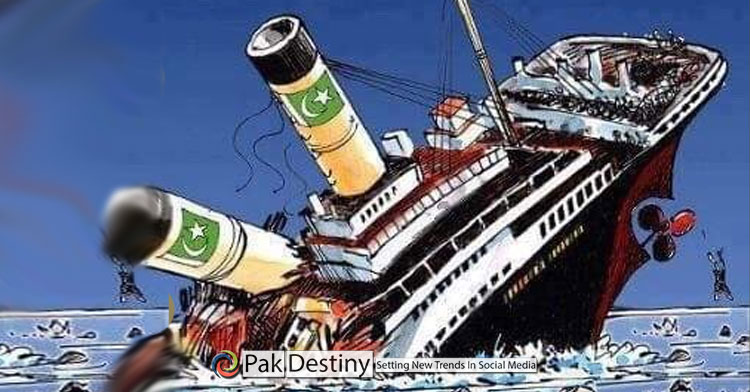
By Raza Ruman
Columnist F S.Aijazuddin rightly out Pakistan in the contest of April 1912 drowning of Titanic.
Over 1500 passengers were killed when the insinkable Titanic wrecked on way to the US from the UK.
“At the moment, we Pakistanis stand crowded on the stern of a Titanic, waving goodbye to our future. It could have been an Ark, slicing through the floods of adversity. Instead, parochial self-interests have smudged the blueprint of national construction.
The result is a leaking, faulty ship of state, with too many captains fighting on its bridge for control, a disobedient crew close to mutiny, and frantic passengers scrambling to find lifeboats.”
He said it could have been otherwise. It was, once. Many can still recall the optimism when, in 1973, the late Zulfikar Ali Bhutto (then president) and his minister Abdul Hafeez Pirzada (who chaired the Constitution Committee) managed to get diverse political parties to agree and sign off on the new Constitution. It was unanimously approved by the fifth parliament on April 10.
“To mark the 50th anniversary of that occasion, our present parliament (not quite the inclusive body foreseen by Mr Bhutto) met on April 10, 2023, and passed a resolution recording “its gratitude and deep appreciation” to Messrs Zulfikar Ali Bhutto, Abdul Hafeez Pirzada and Fazal Elahi Chaudhry (then Speaker) for their “great wisdom, integrity, and impartiality”.
The authors of the 1973 Constitution never claimed perfection. Nothing manmade ever is. No one foresaw this more clearly than did the American founding father Benjamin Franklin.”
Aijazuddin said in 1787, when presenting the US constitution for adoption, he explained: “When you assemble a number of men, to have the advantage of their joint wisdom, you inevitably assemble with those men all their prejudices, their passions, their errors of opinion, their local interests, and their selfish views. From such an assembly can a perfect production be expected?”
It could have been otherwise.
He endorsed the 1787 constitution because, as he put it, “I expect no better”. He then expressed sentiments felt by every hesitant minority that concedes to a majority: “The opinions I have had of its errors I sacrifice for the public good.”
“It was this very spirit that in 1973 brought together from the edges of Pakistan’s diverse polity the Frontier Gandhi Bacha Khan’s son Khan Abdul Wali Khan, Maulanas Mufti Mehmood and Shah Ahmed Noorani, the Baloch Mir Ghaus Bakhsh Bizenjo, the rightist Prof Ghafoor Ahmed, and Mr Bhutto’s Punjabi arch foes Mumtaz Daultana and Sardar Shaukat Hayat.”
The Constitution was formally ratified on Aug 14, 1973, with a mixed sense of occasion. A fly on the wall recalled the moment when Mr Bhutto (now prime minister) and Mr Fazal Elahi Chaudhry (his replacement as the new president) waited outside the National Assembly chamber.
“You go first,” insisted Mr Bhutto. The obsequious Fazal Elahi demurred: “No sir, after you.” Losing patience, Mr Bhutto hissed at him: “You go in first. You’re the bloody president now.” That moment of comedy outside the National Assembly has since degenerated within into a farce.
Mr Aijazuddin further said not all countries are as negligent with their constitutions as we have been. Each pillar of our society — the executive, the legislature, the judiciary, the establishment, and from the sidelines the media — claims superior guardianship of it. Something designed to be an all-purpose tool has become a monkey wrench with which to smite others.
Within parliament, one man and almost 100 silent mannequins masquerade as a cabinet. A future prime minister has received an unexpected benediction of the Americans.
“Time magazine and the Wall Street Journal have carried prominent stories about him. The WSJ deepened the wedge between the captain and his former selectors with this byline: ‘Imran Khan Fights the Army for Control of Nuclear-Armed Pakistan’.
The judiciary with unprecedented infighting has introduced sinister shades of meaning to the words ‘contempt of court’. On April 16, the former Sri Lankan PM/president Chandrika Kumaratunga gave a Zoom address marking 75 years of her country’s independence. She admitted that Sri Lanka was “a failed state”.
The reasons she analysed were: power juggled between five dynasties, sectarian intolerance, corruption at every level, the sham of periodical elections without the transfer of power, and the bankruptcy that has forced it to approach the IMF.
Diplomatic courtesy prevented her from mentioning the Chinese-funded Hambantota port. In 2017, the port had to be leased to China for 99 years when Sri Lanka was unable to repay the money borrowed to build it. Or that her bitter self-analysis was equally, cruelly applicable to Pakistan and Gwadar.
Benjamin Franklin, speaking in 1787, cautioned his colleagues against the failure of any constitution: “[It] can only end in despotism […] when the people shall become so corrupted as to need despotic government, being incapable of any other.”
He could just as well have been addressing Pakistani and Sri Lankan parliamentarians.
One only hope Pakistan doesn’t become a case of Titanic. PAK DESTINY






